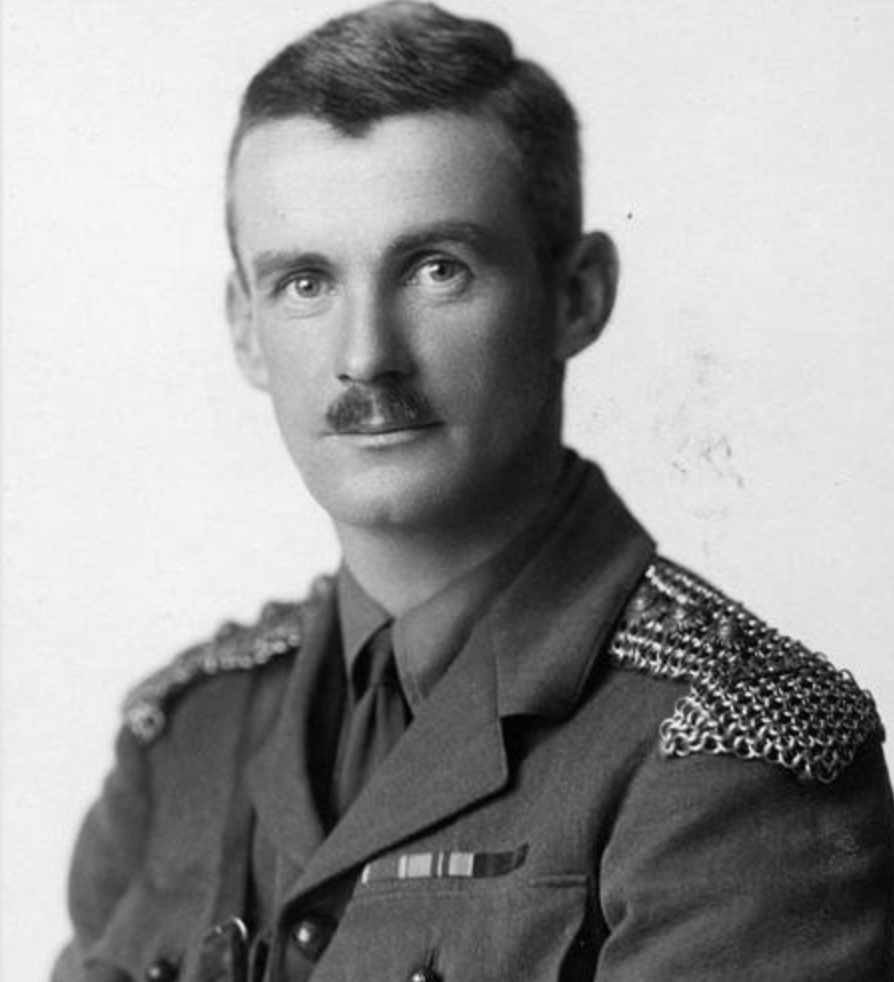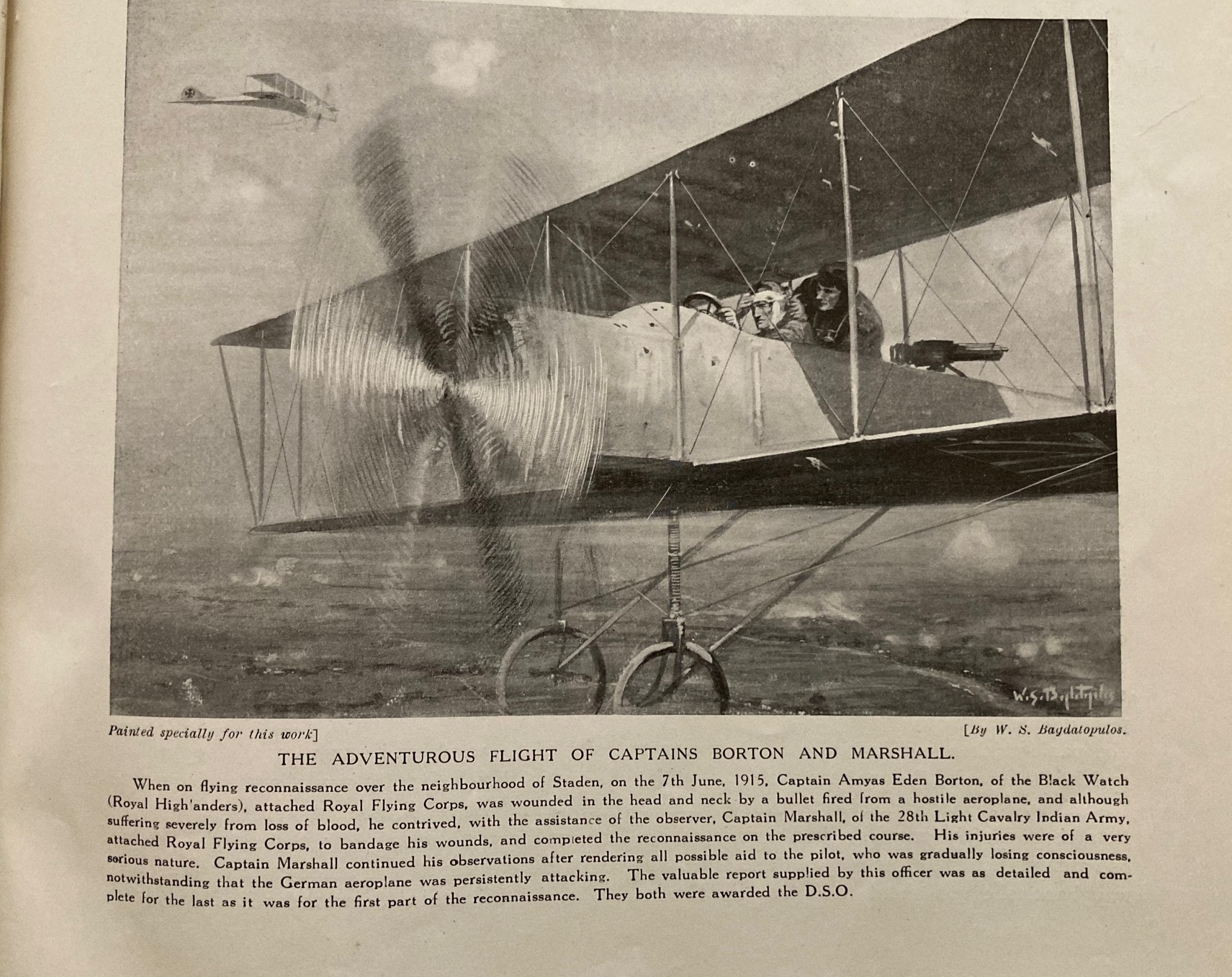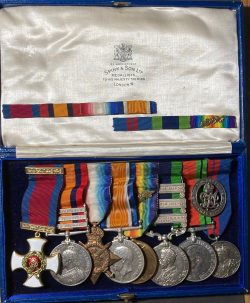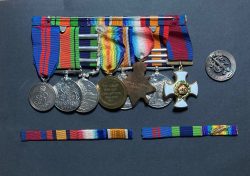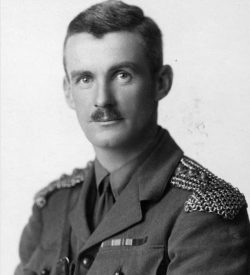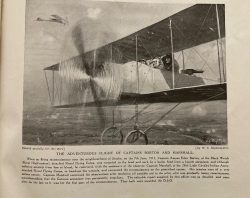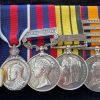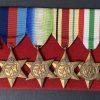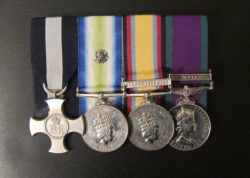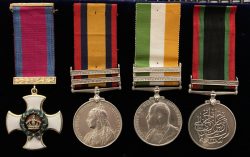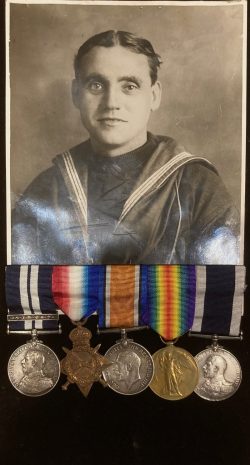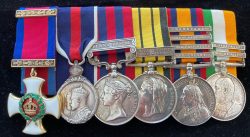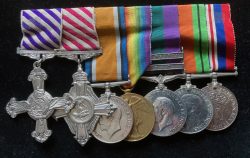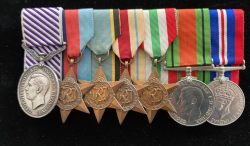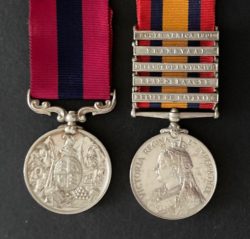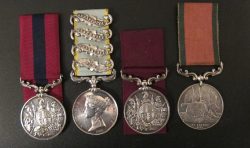Royal Flying Corps D.S.O. 28 Cavalry & RFC A superb award illustrated in ‘Deeds That Thrill The Empire’. His Pilot recommended for the VC in 1915 for the same action, but similarly receiving the DSO. Whilst severely wounded and under attack from an enemy aircraft climbed from seat leaning over to stem the blood flow from his grievously wounded pilot
£5,500.00
Out of stock
Distinguished Service Order, (GV), silver-gilt and enamel, with top bar, Queen’s South Africa Medal three clasps C.C., O.F.S. S.A. 1902, (2/Lt North’d Fus), 1914 Star (Capt. 28/Cavy.), B.W.M. Victory (Mention in Despatches Oak Leaf )(Maj. ), I.G.S. 3 clasps Afghanistan N.W.F. 1919, Waziristan 1919-21 and Waziristan 1921-24. (Maj. 28 Cavy.), War Medal, Defence Medal , 1911 Coronation Medal,
Lt. Col. Anthony Marshall
Contained in an old Spink & Son leather case. With a SWB numbered & marked RAF
Distinguished Service Order, London Gazette, 3 July, 1915: Captain Anthony Marshall, 28th Light Cavalry, Indian Army, attached Royal Flying Corps.
“When on flying reconnaissance over the neighbourhood of Staden on 7 June, 1915, Capt. Borton was wounded in the head and neck by a bullet fired from a hostile aeroplane, and although suffering severely from loss of blood he continued, with the assistance of the Observer, CAPT. MARSHALL, to bandage his wounds, and completed the reconnaissance on the prescribed course. His injuries are such that he is not yet out of danger. CAPT. MARSHALL continued his observations after rendering all possible aid to the Pilot, who was gradually losing consciousness, not withstanding that the German aeroplane was persistently attacking. The valuable report supplied by this Officer is as detailed and complete for the last as it was for the first part of the reconnaissance.”
With original typewritten letter signed by Lieutenant-Colonel Charles James Burke, Commanding Officer, 2nd Wing, Royal Flying Corps, recommending Marshall be considered for a decoration, containing an account of his actions with Capt. A.E. Borton as his Pilot, Borton was recommended for a V.C. but they both received a D.S.O.
Headquarters Royal Flying Corps.
“I have the honour to bring to your notice the gallant conduct of Captain A. MARSHALL, 28th Light Cavalry Indian Army (attached Royal Flying Corps.) He was the Observer in Capt. Borton’s machine on a distance reconnaissance. He saw a hostile machine that was climbing up and even then over-taking them. He got his rifle ready in case he should be able to get a shot but as this was not possible he continued his duty of observing.
His next experience was the crack of bullets round him and Capt. Borton was badly wounded. There then followed a tremendous dive, then a pause, and a tremendously steep climb. After this the machine then came under control and he climbed on to his seat and gave Capt. Borton what he had to staunch his wound.
The time that followed must have been terribly trying. With a badly wounded pilot, who was losing a tremendous amount of blood, and a long way to go, it must have appeared hopeless to expect to get back. The speed of the hostile machine allowed it to go away, reload, and come up in a position where it could in safety deliver gusts of fire, consequently further wounds must have appeared inevitable. Despite this trying situation Capt. MARSHALL continued his duty of observing and rendering a clear report even of the country traversed after Capt. Borton was wounded.
The reconnaissance was one that is performed day after day, but the conduct of this officer during the reconnaissance and the landing, was such as to assist in placing any daily duty on the highest level and to make all reconnaissances once embarked on something that must be completed regardless of cost.
The impression, formed on hearing what had occurred, was that his services were such that they should be brought forward for reward and further consideration of the matter, has confirmed me in this opinion. I therefore have the honour to recommend that this officer be considered for a military decoration.”
In the field 8 June 1915. Signed – C.J. BURKE. Lt. Colonel, Commanding 2 Wing R.F.C.
Anthony Marshall was born 4 April, 1882, son of Lieut.-Colonel Anthony Marshall (late 3rd Northumberland Fusiliers), of Annistead, Chathill. He was educated at Edinburgh Academy and Sandhurst; entered the Northumberland Fusiliers 18 Jan. 1902, and became Lieutenant, Indian Army, 10 May 1904; Captain, 18 Jan. 1911; was Adjutant, Royal Flying Corps, 12 Aug. 1915 to 31 Nov. 1915; was promoted to Major, Indian Army, 18 Jan. 1917, Temporary G.S.O. 2 India. He served in the European War, 1914-17; was wounded while on a flying reconnaissance 7 June 1915 (winning the DSO); was Mentioned in Despatches, and created a Companion of the Distinguished Service Order.
Distinguished Service Order, London Gazette, 3 July, 1915: Captain Anthony Marshall, 28th Light Cavalry, I
-The V.C. and D.S.O. Edited by Sir O’Moore Creagh and E.M Humphris, 1923
Mentioned in Despatches London Gazette 1 Jan. 1916 Captain Anthony Marshall, D.S.O., 28th Cavalry, Indian Army.
His Pilot Captain Amyas Eden Borton was recommended for the VC by the same Commanding Officer (recommendation below) but actually received the DSO with Capt. A. Marshall.
Half page in “Deeds That Thrill the Empire” Vol.1 page 89 for the following action –
Distinguished Service Order London Gazette 3.7.1915 Captain Amyas Eden Borton, The Black Watch (Royal Highlanders), attached Royal Flying Corps. and Captain Anthony Marshall, 28th Light Cavalry, Indian Army, attached Royal Flying Corps.
“When on flying reconnaissance over the neighbourhood of Staden on 7th June, 1915, Captain Amyas Eden Borton of the Black Watch (Royal Highlanders) attached Royal Flying Corps was wounded in the head and neck by a bullet fired from a hostile aeroplane, and although suffering severely from loss of blood he contrived, with the assistance of the Observer, CAPTAIN MARSHALL, of the 28th Light Cavalry, Indian Army attached RFC, to bandage his wounds and completed the reconnaissance on the prescribed course. (his injuries are such that he is not yet out of danger) His injuries were of a very serious nature. CAPTAIN MARSHALL continued his observations after rendering all possible aid to the Pilot, who was gradually losing consciousness, notwithstanding that the German aeroplane was persistently attacking. The valuable report supplied by this Officer was as detailed and complete for the last as it was for the first part of the reconnaissance.” They were both awarded the DSO.
From “My Warrior Sons” (Guy Slater) page 33/34.
Gives details given by his C.O. recommending him for the V.C. “I have the honour to bring to your notice the gallant conduct of Captain A.E. Borton yesterday. “When a long way from our lines he was overtaken by a hostile machine that was greatly superior to his both in climbing power & speed. Soon after the machines met Captain Borton was very badly wounded through the jaws, and the machine became out of control. He apparently pulled himself together by a tremendous effort and regained control.
The situation he then was in was one which might well strike terror into the bravest. He was badly wounded, bleeding terribly without ability to stop it, the hostile machine could with impunity fire at him when it liked, and he was miles from home. He must have watched the hostile machine keep ranging up, get into position, and then a gust of fire. Even if he was not hit again, could he hope to have strength to last until he reached the British lines ? If there ever appeared a hopeless and defenceless position this was one.
It is a marvellous thing that in his condition he could follow his course, but he doggedly stuck to it. He landed perfectly at Abeeleand then collapsed. On slightly recovering, his thoughts were all on completing the duty it had cost him so much to perform.
The gallant conduct and devotion to duty displayed by this officer cannot be brought out in a report, but after the most careful thought and consideration it forces itself on me that he is worthy of the highest award and and I have the honour to submit that he may be awarded the Victoria Cross”
In the field 8 June 1915. Signed – C.J. Burke. Lt. Colonel, Commanding 2 Wing R.F.C.
Extensive file of research, original copy of recommendation for Marshall’s award, copies from “My Warrior Sons” for V.C. Recommendation, MIC, “Deeds That Thrill the Empire”, all Lon. Gaz’s, RAF casualty forms showing ‘wounded 7.6.1915’.
